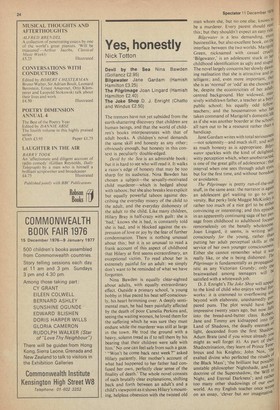Yes, honestly
Nick Totton
Devil by the Sea Nina Bawden (Gollancz £2.95)
Bilgewater Jane Gardam (Hamish Hamilton 0.25)
The Pilgrimage Joan Lingard (Hamish Hamilton £2.40)
The Joke Shop D. J Enright (Chatto and Windus E2.50)
The tremors have not yet subsided from the earth-shattering discovery that children are human beings, and that the world of child ren's books interpenetrates with that of adult books. A children's novel demands the same skill and honesty as any other; obviously enough, but honesty in this context is peculiarly double-edged.
Devil hy the Sea is an admirable book; but it is hard to see who will read it. It walks a razor's edge of honesty that may be too sharp for its audience. Nina Bawden has chosen a subject—the sexually-motivated child murderer—which is hedged about with taboos; but she also breaks less explicit but equally powerful taboos against describing the everyday misery of the child to the adult, and the everyday dishonesty of the adult to the child. Like many children, Hilary Bray is half-crazy with guilt: she is 'bad,' knows she is bad, is constantly told she is bad, and is blocked against the expression of love or joy by the fear of further condemnation. There is nothing unusual about this; but it is so unusual to read a frank account of this aspect of childhood that Hilary at first seems extraordinary, an exceptional victim. To read about her is extremely painful for an adult : we simply don't want to be reminded of what we have forgotten.
Nina Bawden is equally clear-sighted about adults, with equally extraordinary effect. Outside a primary school, 'a young bobby in blue paced his beat self-consciously, his heart brimming over. A deeply sentimental man, he had been painfully affected by the death of poor Camelia Perkins and, seeing the waiting women, he loved them for the suffering which he was sure they must endure while the murderer was still at large in the town. He trod the ground with a heavy, solemn tread as if to tell them by his bearing that their children were safe with him.' No one can feel safe from such a gaze. ' "Won't he come back next week ?" asked Hilary patiently. Her mother's account of what had happened to her father had confused her own, perfectly clear sense of the finality of death.' The whole novel consists of such brutally clear explanations, shifting back and forth between an adult's and a child's viewpoint as it shows Hilary's mounting, helpless obsession with the twisted old
man whom she, hut no one else, knows t°, be a murderer. Every parent should redo this; but they shouldn't expect an easy ride. Bilgewaler is a less demanding, more businesslike, but also excellent book, on the interface between the two worlds. Marigold Green, nicknamed with casual crueltY 'Bilgewater,' is an adolescent stuck in her childhood identification as ugly and stullici' The novel largely concerns her slowly dawn' ing realisation that she is attractive and ia" telligent; and, even more important, that she is as 'normal' or 'odd' as she chooses to be, despite the eccentricities of her adult' centred background. Her widowed, Mas: sively withdrawn father, a teacher at a boys public school; his equally odd fellow teachers; and the housematron who has taken command of Marigold's domestic life as if she was another boarder at the school; all turn out to be a resource rather than a handicap. Jane Gardarn writes with total seriousness —not solemnity—and much skill; and with as much honesty as is appropriate. Bilge' water sparkles with the kind of delighted, witty perception which, when unobstructed' is one of the great gifts of adolescence: that interval when one sees through adult eyes. but for the first time, and without boredorn or avoidance. The Pilgrimage is pretty run-of-the-Mill stuff, in the same area: the narrator is again an adolescent girl waiting to go to uni" versity. But perky little Maggie McKinleY iS rather too much of a nice girl to be either convincing or interesting; and this episode in an apparently continuing saga of her Pas" sage from childhood to adulthood focuses remorselessly on the banally wholesome. Joan Lingard, it seems, is writing selfconsciously for the young, rather than putting her adult perceptual skills at the service of her own younger consciousness' Either she cannot remember what it was really like, or she is being dishonest. Tli,e Pilgrimage is fundamentally as propagaria. istic as any Victorian Grundy; only the brainwashed among teenagers will be satisfied with a whitewash job. D. J. Enright's The Joke Shop will apPea to the kind of child who enjoys verbal fireci
works: it is crammed to overflowing an
beyond with elaborate, unashamedly Prepared puns. The plot would have Neill impressive twenty years ago, but now fall5 into the bread-and-butter class. Robert' Jane and Timmy are kidnapped into the, Land of Shadows, the deadly enemies °I light, descended from the first Shadow. Adum Brate (and if you wince already
might as well forget it). As part of the Shadoctrination, they learn of Prince Tene" breux and his Knights; John Nox, thf exalted divine who perfected the rituals °
the Black Mass'; 'the brilliant but possiblY unstable philosopher Nightshade, and his doctrine of the Supershadow, the Will t()„
Night, and Eternal Darkness'; and rattle' too many other shadowings of our ow° world. As my English teacher once wr0te. on an essay, 'clever but not imaginative'


































 Previous page
Previous page